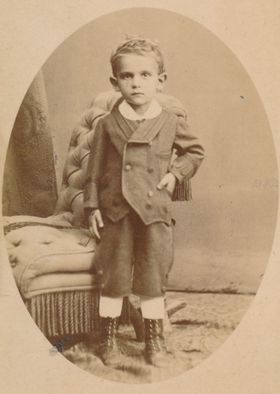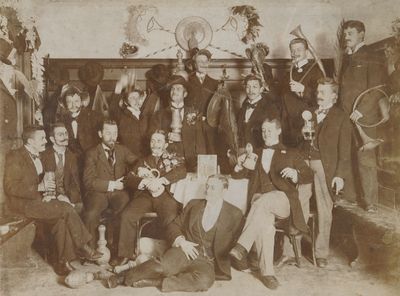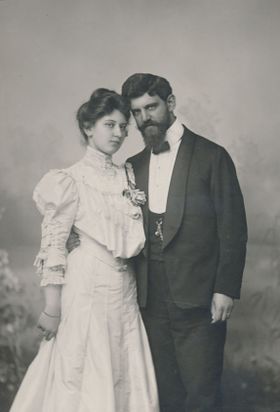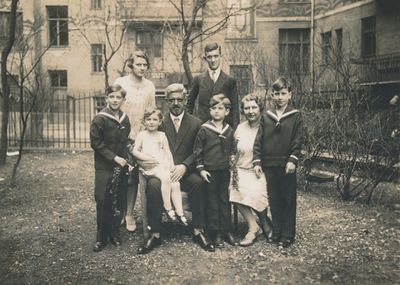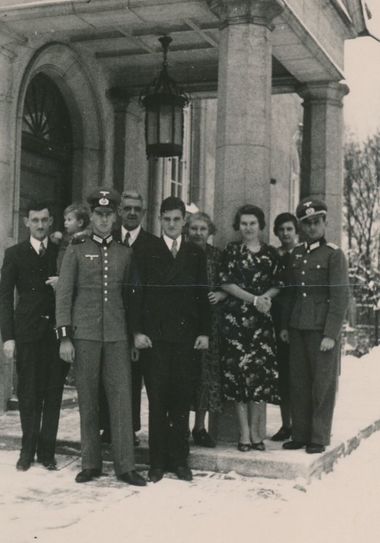Otto Eckart (Da VIII 23)/en: Unterschied zwischen den Versionen
(Die Seite wurde neu angelegt: „====== Studies in Munich and Rostock ======“) |
Keine Bearbeitungszusammenfassung |
||
| (21 dazwischenliegende Versionen desselben Benutzers werden nicht angezeigt) | |||
| Zeile 8: | Zeile 8: | ||
====== Studies in Munich and Rostock ====== | ====== Studies in Munich and Rostock ====== | ||
[[Datei:1898_ca_F02938_Club_Fidelitas_Gruppenbild.jpg|400px|thumb|right| | [[Datei:1898_ca_F02938_Club_Fidelitas_Gruppenbild.jpg|400px|thumb|right|A group picture of the Club Fidelitas from 1898.]]In 1896, at the age of 19 years, Otto started studying agriculture at the Technical University of Munich. In 1898, he spent one term at the Royal Academy for Agriculture and Brewery in Weihenstephan. Back at the Technical University of Munich, he graduated in 1900 with a diploma. Following this, he studied chemistry for three semesters at the University of Rostock. Since his time as a student, Otto was a member of the fraternity Akademischer Chemiker Verein (Academic Chemists’ Association) and of the Münchener Ruderclub (Munich Rowing Club) in Starnberg; he was also active in the [[Das Kaufmanns-Casino/en|Kaufmanns-Casino (Businessmen’s Casino)]] and its youth organization "Fidelitas". It was in the Businessmen’s Casino where he became acquainted with his future wife, [[Anita Hoppe (Da VIII 23)/en|Anita Hoppe]]. During this time, he also started to work in his father’s [[Johs. Eckart Konservenfabrik/en|canning factory]]. From April 1901 to March 1902, Otto Eckart completed his military service as "one-year volunteer" at the [[Otto_Eckart_beim_1._Seebataillon_in_Kiel/en|First Sea Battalion of the naval infantry]] in Kiel.<ref>Eckart, Otto and Kamp, Michael: "Die Geschichte der Familie Eckart. Von Franken nach München und Hawaii" (The History of the Eckart Family. From Franconia to Munich and Hawaii), Munich 2015, pages 209–212.</ref> | ||
[[Datei:1906_F03037_Hochzeit_Otto_Eckart_und_Anita_Hoppe_Brautpaar.jpg|280px|thumb|right| | [[Datei:1906_F03037_Hochzeit_Otto_Eckart_und_Anita_Hoppe_Brautpaar.jpg|280px|thumb|right|Anita and Otto’s wedding picture.]]The will of his father Johannes Eckart originally made provisions for Otto to only enter the family company at the age of 30 years. However, his future father-in-law, a Munich bank director, wanted to ensure the financial security of his daughter Anita prior to the wedding. Otto officially joined the company "Johs. Eckart" in 1906. On October 11 of that year, Anita and Otto got married in Nuremberg. [[Hedwig Eckart (Da VIII 24)/en|Hedwig Eckart]], Otto’s sister, described the couple’s relationship as very harmonious. In their apartment at the address Auenstr. 113, they regularly hosted social evenings at which music was played and discussions took place. Their first daughter, [[Ruth Eckart (Da IX 32)/en|Ruth Eckart]], was born in January 1908, their second child, [[Werner Eckart (Da IX 33)/en|Werner Eckart]], in March 1909. In 1910, the family moved from the city to the countryside, to [[Die Familie Eckart in Poing/en|Poing]]. Otto and Anita had found an old schoolhouse and bought it for the price of 7,120 Mark. Following extensive renovation, the old schoolhouse was turned into a magnificent villa. At Pentecost 1911, they had a jolly housewarming party with 30 guests. In nearby Grub, the canning factory had leased numerous fields and set up an office where Otto was now able to work. The couple had bought a car, a "Sperber" with 17 hp, for commuting between Grub and Poing. On Sundays, Otto, a passionate hunter, regularly participated in hunting parties in Poing. When Ruth Eckart reached compulsory school age in 1914, the family also rented an apartment in Munich, at the address Grillparzerstr. 43, as the children – the third child [[Lisbeth Eckart (Da IX 34)/en|Lisbeth Eckart]] had been born in 1911 – were supposed to go to school in Munich.<ref>Eckart, Otto and Kamp, Michael: "Die Geschichte der Familie Eckart. Von Franken nach München und Hawaii" (The History of the Eckart Family. From Franconia to Munich and Hawaii), Munich 2015, pages 217–226.</ref> | ||
====== | ====== The Years in Kiel ====== | ||
1914 | World War I started in 1914. On August 3, Otto Eckart was drafted into military service in Kiel, but already deferred from military service six days later, as he was considered "indispensable". He returned to Munich and immediately took over the management of the [[Johs. Eckart Konservenfabrik/en|factory in Zamdorf]]. The Eckarts’ canning factory supplied the army with food, mainly canned meat, and dried potatoes. The company also supplied the Ottoman Empire, an ally of the German Empire. In the spring of 1914, Otto traveled to Istanbul on business in order to conduct negotiations with the Turkish Ministry of War. He was drafted again in October 1914, this time to the XII. battalion of the Seewehr (sea defense). In November, he was admitted to a hospital in Kiel due to severe appendicitis. After a severe course of illness and surgery, he was discharged from hospital on December 22 and spent the Christmas holidays with his family in Poing. After a short time in Munich as instructor at the First Infantry Regiment, Otto returned to Kiel in 1915. His family followed at the end of that year. They lived in cramped conditions for a short time, until they were able to move into a spacious apartment in the street Norddeutsche Strasse in 1916. Otto also bought a [[Die Bauernkate Klauseck/en|farmer’s cottage]] in Raisdorf, near Kiel, to ensure the family had enough food which was scarce in times of war. In 1916 – the family had moved again and now lived in a villa on the street Bartelsallee in Kiel – a tragic accident happened. During a walk, the horse ridden by Otto shied. This caused a confusion in which the five-year-old Lisbeth Eckart, who had accompanied her father, was hit by a passing streetcar, and so seriously injured that she died shortly afterwards. Anita Eckart had stayed at home; she was heavily pregnant at that time and less than one month later, on November 14, 1916, [[Klaus Eckart (Da IX 35)/en|Klaus Eckart]] was born.<ref>Eckart, Otto and Kamp, Michael: "Die Geschichte der Familie Eckart. Von Franken nach München und Hawaii" (The History of the Eckart Family. From Franconia to Munich and Hawaii), Munich 2015, pages 229–237.</ref> | ||
In the summer of 1918, the war was clearly drawing to a close. Anita was pregnant again and Otto had been appointed "Königlich Bayerischer Kommerzienrat" (an honorary title bestowed by the King of Bavaria upon distinguished businessmen) on August 5.<ref>Eckart, Otto and Kamp, Michael: "Die Geschichte der Familie Eckart. Von Franken nach München und Hawaii" (The History of the Eckart Family. From Franconia to Munich and Hawaii), Munich 2015, pages 244f.</ref> The November Revolution, which eventually ended World War I and also the German Empire, started in Kiel. The Eckart family witnessed the [[Revolution in Kiel/en|historic events]] first-hand.<ref>Eckart Family Archive, Book of recollections from Poing, 1969.</ref> | |||
====== | ====== Back in Munich ====== | ||
From revolutionary Kiel, the family of Otto and Anita Eckart soon moved back to Bavaria, which before long was to undergo revolution as well. On December 6, [[Fritz Eckart (Da IX 36)/en|Fritz Eckart]], Otto and Anita’s third son, was born in Munich. In 1919, the family lived at the address Grillparzerstrasse 43 again and continued to spend a lot of time in Poing. The former schoolhouse was further modified, and the estate was extended with the purchase of several neighboring plots of land. The family and also the company "Johs. Eckart" survived the currency crisis and the hyperinflation that followed the war. The family’s sixth child, [[Horst Eckart (Da IX 37)/en|Horst Eckart]], was born in April 1921, the seventh, [[Ingeburg Eckart (Da IX 38)/en|Ingeburg Eckart]], in July 1923. Otto was appointed to the supervisory board of the company Donau-Ost AG in 1923 and spent some time away on business in Turkey, Palestine, and Egypt. In the family business "Johs. Eckart", though, there was growing tension between Otto and his nephew [[Hanns Eckart (Da IX 23)/en|Hanns Eckart]]. Eventually, Otto left the company in 1926 and took over a bankrupt [[Edelkonserven-Industrie Bayernwald GmbH/en|canning factory in Ettmansdorf, near Schwandorf]]. With the help of Anita and his eldest son Werner, he tried to put the company back on a successful track. Werner had to quit school to do so but received his father’s stamp collection as compensation. | |||
[[Datei:1927_F00244_DaVe52_50_Geburtstag_Otto_Eckart_Familien-Gruppenbild.jpg|400px|thumb|right|Otto | [[Datei:1927_F00244_DaVe52_50_Geburtstag_Otto_Eckart_Familien-Gruppenbild.jpg|400px|thumb|right|Otto with his family on his 50<sup>th</sup> birthday, March 8, 1927.]]In 1928, Otto joined the "Stahlhelm, Bund der Frontsoldaten" (Steel Helmet, League of Front-Line Soldiers), the paramilitary wing of the antidemocratic German National People's Party DNVP. In 1930, Otto and Anita became grandparents for the first time. Their first-born daughter [[Ruth Eckart (Da IX 32)/en|Ruth Eckart]] had married the business and political economist Fritz Reuter in 1929. Their first son [[Johannes Reuter (Da X 51)/en|Johannes Reuter]] was born on August 28, 1930, in Berlin. | ||
Between 1931 and 1933, Otto Eckart’s family lived at Prinzregentenstrasse 7 in Munich for two years. Despite the pretentious apartment in the heart of Munich, it was a financially difficult time for Otto Eckart’s family. The Great Depression had severely affected the new company, such that it had to declare bankruptcy again in 1932. The estate in Poing was leased, the affiliated agricultural holding and the livestock was sold or leased. Otto built on his good reputation as a businessman to obtain enough capital through mortgages and credits in order to found a new company: The [[Die Firma Pfanni/en|company "Otto Eckart"]] was founded in Munich on July 1, 1932. The business areas included the production of fruit juice and canned food but also the wholesale of groceries. Otto’s contact with the "Stahlhelm" helped him to win his first customers and he started to supply the canteen kitchens in the "Stahlhelm"’s Reich Labour Service camps.<ref>Eckart, Otto and Kamp, Michael: "Die Geschichte der Familie Eckart. Von Franken nach München und Hawaii" (The History of the Eckart Family. From Franconia to Munich and Hawaii), Munich 2015, pages 259ff.</ref> | |||
====== Otto Eckart | ====== Otto Eckart during National Socialism ====== | ||
[[Datei:1938_ca_F03109_Poing_Gruppenbild_Familie_Otto_und_Werner_Eckart.jpg|380px|thumb|right| | [[Datei:1938_ca_F03109_Poing_Gruppenbild_Familie_Otto_und_Werner_Eckart.jpg|380px|thumb|right|A family picture from later years, probably around the beginning of 1938. From left to right: Werner, Otto, Fritz, Otto, Horst, Anita, Anny, Ingeburg, Horst.]]The National Socialists came to power in January 1933. Otto and Anita were in Berlin and thus able to witness the fascist’s torchlight parade through the Brandenburg Gate. In Munich, the National Socialists occupied the City Hall in March and proclaimed their takeover. That same year, they started to systematically persecute Jews and political opponents. Among Otto Eckart’s acquaintances, the successful Jewish businessman Max Uhlfelder was arrested. After his release from jail, he secretly stayed with the Eckart family for a few days before moving on and was eventually able to emigrate via Switzerland to the US. | ||
Franz Ritter von Epp, the new National Socialist Reichsstatthalter (Reich Governor), selected the Eckarts’ apartment at Prinzregentenstrasse 7 as his new office. The family had to move out and moved into a very spacious villa at [[Die Familie Eckart in der Pienzenauerstraße 41/en|Pienzenauerstrasse 41]] in June 1934. Anita’s health increasingly deteriorated during this time. She underwent surgery in July 1934, but still suffered from the consequences of the disease for some time. Werner Eckart and his wife [[Anny Böhm (Da IX 33)/en|Anny Böhm]], a nursery teacher, also lived in the Eckarts’ house since their marriage in 1935. Anny assisted her mother-in-law in the household and also helped in the company "Otto Eckart". The family business was subsequently managed by Otto, Anita, Werner, and Anny. | |||
Anita Eckart | Anita Eckart died at the age of 52 years on June 21, 1939, even before the start of World War II. In the time that followed, Otto Eckart gave more and more responsibility to his first-born son Werner and his daughter-in-law Anny Eckart for managing the family company’s business. Besides her role in the company "Otto Eckart", Anny now took care of the household in Pienzenauerstrasse and nursed her father-in-law Otto who soon became seriously ill. Apart from Werner, who was considered "indispensable" due to his occupation in the company, all of Otto’s sons were drafted into the Wehrmacht, Germany’s armed forces. Before Otto died in Munich at the age of 65 years on December 13, 1942, he had to live through the deaths of his sons Klaus and Fritz Eckart, who died in a war which he, as a member of the "Stahlhelm" and his company as important supplier of the Wehrmacht, had helped prepare.<ref>Eckart, Otto and Kamp, Michael: "Die Geschichte der Familie Eckart. Von Franken nach München und Hawaii" (The History of the Eckart Family. From Franconia to Munich and Hawaii), Munich 2015, pages 281ff.</ref> | ||
== | == Family == | ||
His marriage with Anita Hoppe produced seven children. | |||
* Ruth Eckart (Da IX 32), (*15 | * Ruth Eckart (Da IX 32), (*January 15, 1908, in Munich, Germany, †April 19, 1960, in Munich, Germany). | ||
* [[ | * [[Werner Eckart (Da IX 33)/en|Werner Johannes Adolf Eckart (Da IX 33)]], (*March 27, 1909, in Munich, Germany, †May 15, 1997, in Munich, Germany), canning factory owner, founder of the Pfanni factory, consul of Guatemala and the Philippines, commercial judge, genealogist | ||
* Lisbeth Eckart (Da IX 34), (*14 | * Lisbeth Eckart (Da IX 34), (*October 14, 1911, in Munich, Germany, †October 6, 1916, in Kiel, Germany). | ||
* Klaus Karl Eduard Paul Eckart (Da IX 35), (*14 | * Klaus Karl Eduard Paul Eckart (Da IX 35), (*November 14, 1916, in Kiel, Germany, †June 3, 1940, in Forbach, France), officer, Oberleutnant (first lieutenant). | ||
* Fritz Ruprecht Eckart (Da IX 36), (* | * Fritz Ruprecht Eckart (Da IX 36), (*December 6, 1918, in Munich, Germany, †October 3, 1942, in Beverwjik, Netherlands), Leutnant (the lowest lieutenant officer rank). | ||
* Horst Eckart (Da IX 37), (* | * Horst Eckart (Da IX 37), (*April 8, 1921, in Munich, Germany, †June 26, 1944, in Orsha, Soviet Union), Leutnant (the lowest lieutenant officer rank). | ||
* [[Ingeburg Eckart (Da IX 38)|Ingeburg Eckart (Da IX 38)]], (*23 | * [[Ingeburg Eckart (Da IX 38)/en|Ingeburg Eckart (Da IX 38)]], (*July 23, 1923, in Munich, Germany, †October 27, 2020, in Munich, Germany), professor of music, senior teacher. | ||
== | == References == | ||
Aktuelle Version vom 30. August 2021, 11:53 Uhr
Otto Friedrich Richard Eckart, (Da VIII 23), (*March 8, 1877, in Munich, Germany, †December 13, 1942, in Munich, Germany), canning factory owner, qualified agronomist, königlich bayer. Kommerzienrat (an honorary title bestowed by the King of Bavaria upon distinguished businessmen), captain, genealogist; married Anita Doris Wilhelmine Hoppe on October 11, 1906, in Munich, Germany.
Childhood at the Square Gärtnerplatz
Otto Eckart was born on March 8, 1877, in the house at Gärtnerplatz 1 in Munich. He was the eighth of Johannes and Susanne Eckart’s 13 children. His younger sister Hedwig describes Otto as a "delicate and sickly child" that his siblings frequently had to escort home early from the elementary school they attended together. The time at the high school Luitpold-Gymnasium in Munich was a difficult one for Otto; he was only enthused by the subjects of drawing and music. Therefore, his father took him out of school after the intermediate school certificate and sent him to Bordeaux for a year abroad, as he had done previously with Otto’s brother Fritz. There, Otto stayed with friends of the Eckarts – the Horeau family, whose son stayed on an exchange with the Eckarts in Munich – and attended commercial school. After staying in Bordeaux, Otto spent some time in Paris. When back in Munich, he spoke "impeccable French, had a likeable, confident, elegant demeanor, looked very interesting … and endeared himself to everybody." However, the fact that Otto had turned into a bon vivant subsequently got him into many a scrape.[1]
Studies in Munich and Rostock
In 1896, at the age of 19 years, Otto started studying agriculture at the Technical University of Munich. In 1898, he spent one term at the Royal Academy for Agriculture and Brewery in Weihenstephan. Back at the Technical University of Munich, he graduated in 1900 with a diploma. Following this, he studied chemistry for three semesters at the University of Rostock. Since his time as a student, Otto was a member of the fraternity Akademischer Chemiker Verein (Academic Chemists’ Association) and of the Münchener Ruderclub (Munich Rowing Club) in Starnberg; he was also active in the Kaufmanns-Casino (Businessmen’s Casino) and its youth organization "Fidelitas". It was in the Businessmen’s Casino where he became acquainted with his future wife, Anita Hoppe. During this time, he also started to work in his father’s canning factory. From April 1901 to March 1902, Otto Eckart completed his military service as "one-year volunteer" at the First Sea Battalion of the naval infantry in Kiel.[2]
The will of his father Johannes Eckart originally made provisions for Otto to only enter the family company at the age of 30 years. However, his future father-in-law, a Munich bank director, wanted to ensure the financial security of his daughter Anita prior to the wedding. Otto officially joined the company "Johs. Eckart" in 1906. On October 11 of that year, Anita and Otto got married in Nuremberg. Hedwig Eckart, Otto’s sister, described the couple’s relationship as very harmonious. In their apartment at the address Auenstr. 113, they regularly hosted social evenings at which music was played and discussions took place. Their first daughter, Ruth Eckart, was born in January 1908, their second child, Werner Eckart, in March 1909. In 1910, the family moved from the city to the countryside, to Poing. Otto and Anita had found an old schoolhouse and bought it for the price of 7,120 Mark. Following extensive renovation, the old schoolhouse was turned into a magnificent villa. At Pentecost 1911, they had a jolly housewarming party with 30 guests. In nearby Grub, the canning factory had leased numerous fields and set up an office where Otto was now able to work. The couple had bought a car, a "Sperber" with 17 hp, for commuting between Grub and Poing. On Sundays, Otto, a passionate hunter, regularly participated in hunting parties in Poing. When Ruth Eckart reached compulsory school age in 1914, the family also rented an apartment in Munich, at the address Grillparzerstr. 43, as the children – the third child Lisbeth Eckart had been born in 1911 – were supposed to go to school in Munich.[3]
The Years in Kiel
World War I started in 1914. On August 3, Otto Eckart was drafted into military service in Kiel, but already deferred from military service six days later, as he was considered "indispensable". He returned to Munich and immediately took over the management of the factory in Zamdorf. The Eckarts’ canning factory supplied the army with food, mainly canned meat, and dried potatoes. The company also supplied the Ottoman Empire, an ally of the German Empire. In the spring of 1914, Otto traveled to Istanbul on business in order to conduct negotiations with the Turkish Ministry of War. He was drafted again in October 1914, this time to the XII. battalion of the Seewehr (sea defense). In November, he was admitted to a hospital in Kiel due to severe appendicitis. After a severe course of illness and surgery, he was discharged from hospital on December 22 and spent the Christmas holidays with his family in Poing. After a short time in Munich as instructor at the First Infantry Regiment, Otto returned to Kiel in 1915. His family followed at the end of that year. They lived in cramped conditions for a short time, until they were able to move into a spacious apartment in the street Norddeutsche Strasse in 1916. Otto also bought a farmer’s cottage in Raisdorf, near Kiel, to ensure the family had enough food which was scarce in times of war. In 1916 – the family had moved again and now lived in a villa on the street Bartelsallee in Kiel – a tragic accident happened. During a walk, the horse ridden by Otto shied. This caused a confusion in which the five-year-old Lisbeth Eckart, who had accompanied her father, was hit by a passing streetcar, and so seriously injured that she died shortly afterwards. Anita Eckart had stayed at home; she was heavily pregnant at that time and less than one month later, on November 14, 1916, Klaus Eckart was born.[4]
In the summer of 1918, the war was clearly drawing to a close. Anita was pregnant again and Otto had been appointed "Königlich Bayerischer Kommerzienrat" (an honorary title bestowed by the King of Bavaria upon distinguished businessmen) on August 5.[5] The November Revolution, which eventually ended World War I and also the German Empire, started in Kiel. The Eckart family witnessed the historic events first-hand.[6]
Back in Munich
From revolutionary Kiel, the family of Otto and Anita Eckart soon moved back to Bavaria, which before long was to undergo revolution as well. On December 6, Fritz Eckart, Otto and Anita’s third son, was born in Munich. In 1919, the family lived at the address Grillparzerstrasse 43 again and continued to spend a lot of time in Poing. The former schoolhouse was further modified, and the estate was extended with the purchase of several neighboring plots of land. The family and also the company "Johs. Eckart" survived the currency crisis and the hyperinflation that followed the war. The family’s sixth child, Horst Eckart, was born in April 1921, the seventh, Ingeburg Eckart, in July 1923. Otto was appointed to the supervisory board of the company Donau-Ost AG in 1923 and spent some time away on business in Turkey, Palestine, and Egypt. In the family business "Johs. Eckart", though, there was growing tension between Otto and his nephew Hanns Eckart. Eventually, Otto left the company in 1926 and took over a bankrupt canning factory in Ettmansdorf, near Schwandorf. With the help of Anita and his eldest son Werner, he tried to put the company back on a successful track. Werner had to quit school to do so but received his father’s stamp collection as compensation.
In 1928, Otto joined the "Stahlhelm, Bund der Frontsoldaten" (Steel Helmet, League of Front-Line Soldiers), the paramilitary wing of the antidemocratic German National People's Party DNVP. In 1930, Otto and Anita became grandparents for the first time. Their first-born daughter Ruth Eckart had married the business and political economist Fritz Reuter in 1929. Their first son Johannes Reuter was born on August 28, 1930, in Berlin.
Between 1931 and 1933, Otto Eckart’s family lived at Prinzregentenstrasse 7 in Munich for two years. Despite the pretentious apartment in the heart of Munich, it was a financially difficult time for Otto Eckart’s family. The Great Depression had severely affected the new company, such that it had to declare bankruptcy again in 1932. The estate in Poing was leased, the affiliated agricultural holding and the livestock was sold or leased. Otto built on his good reputation as a businessman to obtain enough capital through mortgages and credits in order to found a new company: The company "Otto Eckart" was founded in Munich on July 1, 1932. The business areas included the production of fruit juice and canned food but also the wholesale of groceries. Otto’s contact with the "Stahlhelm" helped him to win his first customers and he started to supply the canteen kitchens in the "Stahlhelm"’s Reich Labour Service camps.[7]
Otto Eckart during National Socialism
The National Socialists came to power in January 1933. Otto and Anita were in Berlin and thus able to witness the fascist’s torchlight parade through the Brandenburg Gate. In Munich, the National Socialists occupied the City Hall in March and proclaimed their takeover. That same year, they started to systematically persecute Jews and political opponents. Among Otto Eckart’s acquaintances, the successful Jewish businessman Max Uhlfelder was arrested. After his release from jail, he secretly stayed with the Eckart family for a few days before moving on and was eventually able to emigrate via Switzerland to the US.
Franz Ritter von Epp, the new National Socialist Reichsstatthalter (Reich Governor), selected the Eckarts’ apartment at Prinzregentenstrasse 7 as his new office. The family had to move out and moved into a very spacious villa at Pienzenauerstrasse 41 in June 1934. Anita’s health increasingly deteriorated during this time. She underwent surgery in July 1934, but still suffered from the consequences of the disease for some time. Werner Eckart and his wife Anny Böhm, a nursery teacher, also lived in the Eckarts’ house since their marriage in 1935. Anny assisted her mother-in-law in the household and also helped in the company "Otto Eckart". The family business was subsequently managed by Otto, Anita, Werner, and Anny.
Anita Eckart died at the age of 52 years on June 21, 1939, even before the start of World War II. In the time that followed, Otto Eckart gave more and more responsibility to his first-born son Werner and his daughter-in-law Anny Eckart for managing the family company’s business. Besides her role in the company "Otto Eckart", Anny now took care of the household in Pienzenauerstrasse and nursed her father-in-law Otto who soon became seriously ill. Apart from Werner, who was considered "indispensable" due to his occupation in the company, all of Otto’s sons were drafted into the Wehrmacht, Germany’s armed forces. Before Otto died in Munich at the age of 65 years on December 13, 1942, he had to live through the deaths of his sons Klaus and Fritz Eckart, who died in a war which he, as a member of the "Stahlhelm" and his company as important supplier of the Wehrmacht, had helped prepare.[8]
Family
His marriage with Anita Hoppe produced seven children.
- Ruth Eckart (Da IX 32), (*January 15, 1908, in Munich, Germany, †April 19, 1960, in Munich, Germany).
- Werner Johannes Adolf Eckart (Da IX 33), (*March 27, 1909, in Munich, Germany, †May 15, 1997, in Munich, Germany), canning factory owner, founder of the Pfanni factory, consul of Guatemala and the Philippines, commercial judge, genealogist
- Lisbeth Eckart (Da IX 34), (*October 14, 1911, in Munich, Germany, †October 6, 1916, in Kiel, Germany).
- Klaus Karl Eduard Paul Eckart (Da IX 35), (*November 14, 1916, in Kiel, Germany, †June 3, 1940, in Forbach, France), officer, Oberleutnant (first lieutenant).
- Fritz Ruprecht Eckart (Da IX 36), (*December 6, 1918, in Munich, Germany, †October 3, 1942, in Beverwjik, Netherlands), Leutnant (the lowest lieutenant officer rank).
- Horst Eckart (Da IX 37), (*April 8, 1921, in Munich, Germany, †June 26, 1944, in Orsha, Soviet Union), Leutnant (the lowest lieutenant officer rank).
- Ingeburg Eckart (Da IX 38), (*July 23, 1923, in Munich, Germany, †October 27, 2020, in Munich, Germany), professor of music, senior teacher.
References
- ↑ Eckart, Otto and Kamp, Michael: "Die Geschichte der Familie Eckart. Von Franken nach München und Hawaii" (The History of the Eckart Family. From Franconia to Munich and Hawaii), Munich 2015, page 209.
- ↑ Eckart, Otto and Kamp, Michael: "Die Geschichte der Familie Eckart. Von Franken nach München und Hawaii" (The History of the Eckart Family. From Franconia to Munich and Hawaii), Munich 2015, pages 209–212.
- ↑ Eckart, Otto and Kamp, Michael: "Die Geschichte der Familie Eckart. Von Franken nach München und Hawaii" (The History of the Eckart Family. From Franconia to Munich and Hawaii), Munich 2015, pages 217–226.
- ↑ Eckart, Otto and Kamp, Michael: "Die Geschichte der Familie Eckart. Von Franken nach München und Hawaii" (The History of the Eckart Family. From Franconia to Munich and Hawaii), Munich 2015, pages 229–237.
- ↑ Eckart, Otto and Kamp, Michael: "Die Geschichte der Familie Eckart. Von Franken nach München und Hawaii" (The History of the Eckart Family. From Franconia to Munich and Hawaii), Munich 2015, pages 244f.
- ↑ Eckart Family Archive, Book of recollections from Poing, 1969.
- ↑ Eckart, Otto and Kamp, Michael: "Die Geschichte der Familie Eckart. Von Franken nach München und Hawaii" (The History of the Eckart Family. From Franconia to Munich and Hawaii), Munich 2015, pages 259ff.
- ↑ Eckart, Otto and Kamp, Michael: "Die Geschichte der Familie Eckart. Von Franken nach München und Hawaii" (The History of the Eckart Family. From Franconia to Munich and Hawaii), Munich 2015, pages 281ff.
